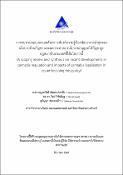บทคัดย่อ
รายงานฉบับนี้เป็นผลของการทบทวน สังเคราะห์และจัดการองค์ความรู้ในประเด็นที่เกี่ยวข้องกับมาตรการควบคุมกัญชา และผลกระทบของการออกกฎหมายอนุญาตให้ใช้กัญชาเพื่อนันทนาการ (Recreational Cannabis Legalization) ในต่างประเทศ เพื่อเป็นข้อมูลพื้นฐานสำหรับการพัฒนาด้านนโยบายที่อิงหลักฐานวิชาการ การพัฒนาด้านวิชาการและวิจัยต่อไปในประเทศไทย โดยตอบคำถามสำคัญ 5 ข้อ ดังนี้ 1. รูปแบบของการควบคุมกัญชาในประเทศต่างๆ ในปัจจุบันเป็นอย่างไร 2. รูปแบบทางเลือกและข้อควรคำนึงในการออกแบบมาตรการควบคุมกัญชามีอะไรบ้าง 3. ผลกระทบของการอนุญาตให้ใช้กัญชาเพื่อนันทนาการภายใต้อนุสัญญาควบคุมสารเสพติดระหว่างประเทศ มีอะไรบ้าง 4. ผลกระทบของการอนุญาตจำหน่ายหรือจัดหากัญชาเพื่อใช้แบบนันทนาการในประเทศที่มีนโยบายแบบนี้เป็นอย่างไร และ 5. ข้อเสนอแนะด้านวิชาการและวิจัยในประเด็นที่เกี่ยวกับการเฝ้าระวังและประเมินผลกระทบของนโยบายด้านกัญชาในประเทศไทยควรเป็นอย่างไร วิธีการศึกษา เนื่องจากเป็นการจัดทำรายงานการทบทวนองค์ความรู้ในระยะเวลาจำกัดมาก (เพียงสี่เดือนเท่านั้น) ผู้รายงานจึงเริ่มจากการค้นหารายงานการศึกษาแบบการทบทวนแบบเป็นระบบ (Systematic Review) ที่ตีพิมพ์ล่าสุดก่อน แล้วจึงค้นหารายงานการศึกษาที่เป็นนิพนธ์ต้นฉบับ (Original Paper) มาเพิ่มเติม เพื่อให้ได้ข้อมูลที่ทันสมัยในประเด็นนั้นๆ โดยใช้ PubMed เป็นฐานข้อมูลหลักในการค้นหารายงานวิจัยตีพิมพ์ ร่วมกับ Google เพื่อเพิ่มเติมในบางส่วน โดยให้ความสำคัญกับรายงานการศึกษาที่ตีพิมพ์ในวารสารที่มีการประเมินคุณภาพ (Peer-Reviewed Articles) มากกว่ารายงานหรือเอกสารที่ตีพิมพ์เผยแพร่โดยกลุ่มใดกลุ่มหนึ่ง และผู้รายงานได้พยายามประเมินเพื่อคัดเลือกการศึกษาที่มีระเบียบวิธีวิจัยที่ดี มีการสุ่มตัวอย่างที่เหมาะสมเพื่อเป็นตัวแทนของประชากรระดับรัฐหรือประเทศ และมีกลุ่มเปรียบเทียบ เช่น การเทียบระหว่างรัฐที่มีกับไม่มีกฎหมายกัญชา หรือระหว่างก่อนและหลังการออกกฎหมายกัญชา เช่น งานวิจัยแบบ Quasi-Experimental หรืองานที่ใช้ Interrupted Time-Series Analysis เป็นต้น ผลการศึกษามาตรการในการควบคุมกัญชาตามกฎหมาย แบ่งออกได้เป็น 5 รูปแบบ ได้แก่ 1. การกำหนดให้กัญชาเป็นยาเสพติดผิดกฎหมาย การใช้จำหน่าย ครอบครองกัญชาถือว่ามีความผิดทั้งหมด ต้องได้รับโทษทางอาญา ซึ่งเป็นรูปแบบที่ใช้ในประเทศส่วนใหญ่ในโลก โดยเฉพาะประเทศในทวีปเอเชีย เช่น ประเทศอัฟกานิสถาน บาห์เรน บรูไน ดารุสซาลาม อินโดนีเซีย ญี่ปุ่น อิรัก มาเลเซีย 2. การกำหนดให้กัญชาเป็นยาเสพติดผิดกฎหมาย แต่ลดทอนความเป็นอาชญากรรมของกัญชา (Decriminalization) เช่น กำหนดให้ผู้เสพกัญชาถูกปรับ ไม่ต้องรับโทษทางอาญา แต่ผู้จำหน่ายกัญชายังต้องรับโทษทางอาญา ประเทศทางยุโรปบางส่วนอยู่ในกลุ่มนี้ เช่น ประเทศเบลีซ โบลิเวีย โดมินิกา มอลโดวา ปารากวัย เซนต์ลูเซีย 3. การกำหนดให้กัญชายังเป็นยาเสพติดให้โทษ แต่อนุญาตให้ใช้กัญชาทางการแพทย์ เช่น ประเทศเลบานอน ลิทัวเนีย นิวซีแลนด์ มาซิโดเนียเหนือ นอร์เวย์ 4. การกำหนดให้กัญชาไม่เป็นยาเสพติด แต่มีการควบคุมการใช้ในทางที่ผิดอย่างเข้มงวด เช่น จำกัดจำนวนการครอบครอง การห้ามจำหน่ายให้เยาวชน การห้ามโฆษณา การห้ามขับขี่ยานพาหนะหากเสพกัญชาและการใช้มาตรการทางภาษีกัญชา ฯลฯ เช่น ประเทศแคนาดา สหรัฐอเมริกา (บางรัฐ) และประเทศอุรุกวัย และ 5. การกำหนดให้กัญชาไม่เป็นยาเสพติดและปล่อยให้เกิดกลไกการตลาดแข่งขันเสรี ปลูก จำหน่ายโฆษณาได้หรือค่อนข้างเสรี ณ ปัจจุบันมี 47 ประเทศที่มีกฎหมายอนุญาตให้ใช้กัญชา เพื่อวัตถุประสงค์ทางการแพทย์ 38 ประเทศที่มีการลดทอนโทษอาญาของการครอบครองและใช้กัญชา นอกจากนั้นรายงานฉบับนี้ได้สรุปรูปแบบทางเลือกในการออกแบบมาตรการลดการควบคุมกัญชา การควบคุมกัญชาภายใต้กฎหมายระหว่างประเทศ ผลกระทบของการออกนโยบายอนุญาตให้ใช้กัญชาเพื่อนันทนาการต่อสุขภาพและสังคม ประกอบด้วย ผลกระทบทางสุขภาพและสาธารณสุข ผลกระทบทางสังคมและเศรษฐกิจ และข้อเสนอแนะต่อโอกาสพัฒนาสำหรับประเทศไทย
บทคัดย่อ
This report is a review, synthesis, and knowledge management of cannabis control and the impacts of recreational cannabis legislation overseas to serve as basic information for evidence-based policy-making, technical development, and research in Thailand. There are five main questions: 1. What are the current forms of cannabis control in various countries? 2. What are the options and considerations in designing cannabis control measures? 3. What are the impacts of recreational cannabis legalization under the International Drug Control Conventions? 4. What are the impacts of allowing the sale or procurement of recreational cannabis, i.e., “cannabis liberalization policy” among implemented countries? and 5. What are the recommended technical and research actions pertaining to monitoring and evaluation of cannabis policy in Thailand? METHODS Due to the short period of time to produce this review (4 months), the authors started by searching for the most recent systematic reviews, followed by additional original papers to obtain recent data on each issue. The authors used PubMed as the main database to search for the literatures, followed by Google (where applicable). The authors paid more attention to peer-reviewed articles than reports or documents published by a particular group. The authors also tried to assess and select studies with proper methodology, samples that were representative of the state or country-level population, and with a comparison group. Examples include comparison of states with and without cannabis legalization laws, before and after cannabis legislation, quasi-experimental studies, and research work with interrupted time-series analysis. RESULTS Legal measures to control cannabis can be categorized into 5 types: 1. Criminalization of cannabis, including use, distribution, and possession thereof. This is the most common form of control worldwide, particularly in Asian countries such as Afghanistan, Bahrain, Brunei Darussalam, Indonesia, Japan, Iraq, and Malaysia. 2. Designation of cannabis as an illegal but decriminalized substance. This includes imposing a fine for users but without legal penalty. Vendors remain liable for criminal penalty. This form of control is practiced in some Western countries, including Belize, Bolivia, Dominica, Moldova, Paraguay, and Saint Lucia 3. Designation of cannabis as a narcotic with allowance for medical use, such as in Lebanon, Lithuania, New Zealand, North Macedonia, and Norway 4. Decriminalization of cannabis but with strict control of misuse. This form of control includes limitation of possession amount, prohibitions (of sale to youths, advertising, operating vehicles under the influence), and use of cannabis taxation. Countries practicing this form of control include Canada, the United States (in certain states), and Uruguay 5. Decriminalization of cannabis and allowance for free market competition, with free or relatively free ability to cultivate, distribute, or advertise. Currently, there are 47 countries where the laws allow for use of cannabis for legal purposes, 38 countries with depenalization for cannabis possession and use. Options in reduced control of cannabis. Cannabis control under international law. Impact of recreational cannabis policy on health and society. Health and social impacts, Social and economic impacts and Recommendations for development of cannabis policy in Thailand.


